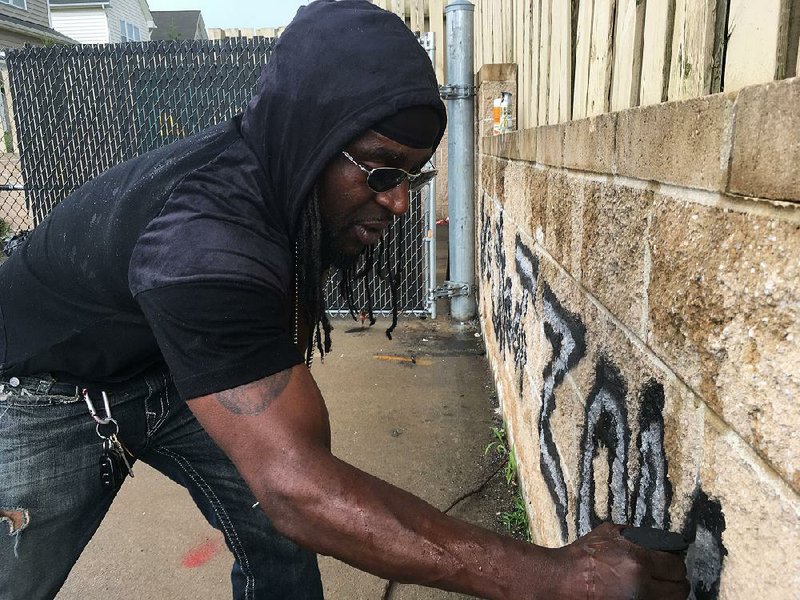BALTIMORE -- The number of homicides in Baltimore surpassed 200, making 2017 a record-setting year for violence on the city's streets.
As the body count rises, the Police Department has reassigned 150 officers to the city's most dangerous areas but is still struggling to curb the bloodshed amid internal turmoil and mounting criticism. Mayor Catherine Pugh said she's developed a plan to stop the violence, but hasn't yet made it public.
In the meantime, Baltimore residents are taking matters into their own hands, proposing a 72-hour cease-fire that would go into effect Friday and last at least through Sunday.
Erricka Bridgeford, a professional conflict mediator in Baltimore, is one of the organizers of the cease-fire, whose motto is "Nobody Kill Anybody."
No individual or organization alone has taken credit for the event, Bridgeford said, and that's intentional. That way, it belongs to every single Baltimore resident, she said.
The idea is to persuade shooters to put down their guns for three whole days and remember what it feels like to make a positive decision for themselves and for their city.
"We understand that this is not what normal should be, and we deserve something better," Bridgeford said. "Looking at each other and saying, 'We deserve peace for three whole days' -- that's powerful."
Bridgeford is no stranger to the effect of violence on communities. She first saw someone shot and killed when she was 12 years old.
"I heard shots that woke me up out of my sleep [when] my friend Mike was shot. I saw him on the blacktop, I heard him crying not to let him die," she said. "I went to funerals all through high school."
She said she's lost friends and cousins to gunshots, she said -- "so many cousins."
As James Evans, a Baltimore-based advertising executive, watched the body count in Baltimore skyrocket earlier this year, he thought he might be able to help.
Evans' firm, Illume, is behind the "Stop Shooting, Start Living" slogan used by a local chapter of the community-based, anti-violence organization Safe Streets. Now he's trying to combat the bloodshed with an advertising campaign targeting people most likely to pick up a gun and pull the trigger.
As he does with any campaign, Evans said, he treats his anti-violence pitch like a product he's selling. He said he's conducted focus groups with victims, active shooters and drug dealers to try to figure out how best to market the message. In one video, a fight breaks out and a man opens fire on a group, only to have his infant daughter caught in the crossfire.
"Humanizing the victims is really important," Evans said. "People talk about Baltimore city and crime, and they talk about it in the voice of fear, not the voice of empathy. The voice of fear suggests that crime just exists here, not that victims exist here.
"We're incentivizing kids not to become criminals in the first place. You could go from being a hardworking citizen, lose your temper, do the wrong thing and become a criminal in five seconds. When you're 18, you're living in an underserved community, you're frightened all the time. People don't understand how quickly these kids need to react. That is what we're trying to do: empathize with these young guys, and say, 'We understand that your situation is challenging; don't make it more so.'"
Another anti-violence activist is Tyree Colion, who is on a mission to convert areas of gun violence into "no shoot zones."
He tries to create what he calls "invisible force fields" against violence by spray-painting messages on buildings and other structures where violence has occurred.
Those most likely to pick up guns recognize these zones and neutral areas: They respect the space, he said.
The messages "stop shootings, first and foremost," Colion said. "At worst, it looks like graffiti. But to different gangs, they know what this means: 'I don't fear police, I don't respect anything else, but I respect this.'"
He's christened 27 such zones in Baltimore city. The fatal shooting of a 13-year-old girl Tuesday is what took him across the line into Baltimore County for the first time.
He'd gone to paint a brick wall behind a convenience store, near where the shooting had taken place.
The paint hadn't even begun to dry when four police cars and six uniformed officers showed up on the scene. The wall Colion had painted was privately owned, they said. Colion insisted he'd gotten permission from a store owner. After 20 minutes of back and forth, Colion was arrested and charged with destruction of property.
"You can't stop this," Colion said to an officer as he was being handcuffed, pointing his chin toward a memorial to the girl set up on a staircase and decorated with teddy bears and a big bunch of balloons.
"I can."
A Section on 08/05/2017

